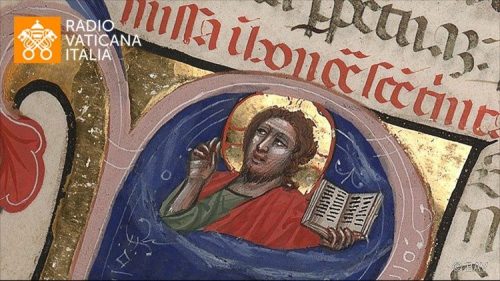READING OF THE DAY
2 JN 4-9
[Chosen Lady:]
I rejoiced greatly to find some of your children walking in the truth
just as we were commanded by the Father.
But now, Lady, I ask you,
not as though I were writing a new commandment
but the one we have had from the beginning:
let us love one another.
For this is love, that we walk according to his commandments;
this is the commandment, as you heard from the beginning,
in which you should walk.
Many deceivers have gone out into the world,
those who do not acknowledge Jesus Christ as coming in the flesh;
such is the deceitful one and the antichrist.
Look to yourselves that you do not lose what we worked for
but may receive a full recompense.
Anyone who is so “progressive”
as not to remain in the teaching of the Christ does not have God;
whoever remains in the teaching has the Father and the Son.
GOSPEL OF THE DAY
LK 17:26-37
Jesus said to his disciples:
“As it was in the days of Noah,
so it will be in the days of the Son of Man;
they were eating and drinking,
marrying and giving in marriage up to the day
that Noah entered the ark,
and the flood came and destroyed them all.
Similarly, as it was in the days of Lot:
they were eating, drinking, buying,
selling, planting, building;
on the day when Lot left Sodom,
fire and brimstone rained from the sky to destroy them all.
So it will be on the day the Son of Man is revealed.
On that day, someone who is on the housetop
and whose belongings are in the house
must not go down to get them,
and likewise one in the field
must not return to what was left behind.
Remember the wife of Lot.
Whoever seeks to preserve his life will lose it,
but whoever loses it will save it.
I tell you, on that night there will be two people in one bed;
one will be taken, the other left.
And there will be two women grinding meal together;
one will be taken, the other left.”
They said to him in reply, “Where, Lord?”
He said to them, “Where the body is,
there also the vultures will gather.”
WORDS OF THE HOLY FATHER
“Thinking about our death is not a bad fantasy”; in fact, living well every day as if it were “the last” and not as if this life were “a normality” that lasts forever, can help you to be truly ready when the Lord calls. It is an invitation to serenely recognize the existential truth of our existence what Pope Francis proposed at the Mass celebrated […] in Santa Marta.
“In these last two weeks of the liturgical year,” he immediately noted, “the Church in the readings, in the mass, makes us reflect on the end.” On the one hand, of course “the end of the world, because the world will collapse, will be transformed” and “the coming of Jesus will come at the end”. But, on the other hand, the Church also speaks of the “end of each one of us, because each one of us will die: the Church, as mother, teacher, wants each of us to think about our own death”.
“It strikes me,” the Pontiff confessed, referring to the Gospel passage of St. Luke (17, 26-37) – what Jesus says in this passage we have read. In particular his answer “when they ask what the end of the world will be like.” But, meanwhile, the Pope relaunched the words of the Lord, “let’s think about what my end will be like.” In the Gospel Jesus uses the expressions “as it happened in the days of Noah” and “as it happened in the days of Lot.” To say, he explained, that men “at that time ate, drank, took a wife, took a husband, until the day that Noah entered the ark.” And, still “as it happened in the days of Lot: they ate, they drank, they bought, they sold, they planted, they built.”
But behold, the Pope continued, when “the day comes when the Lord rains fire and brimstone from heaven.” In short, “there is normality, life is normal,” said Francisco, “and we are used to this normality: I get up at six, I get up at seven, I do this, I do this job, I’m going to find this tomorrow, Sunday is party, I do this ». And “thus we are accustomed to living a normal life and we think that this will always be the case”. But it will be, added the Pontiff, “until the day that Noah went up into the ark, until the day the Lord caused fire and brimstone to fall from heaven.”
Because surely “there will come a day when the Lord will tell each one of us:” come “,” recalled the Pontiff. And «the call for some will be sudden, for others it will be after an illness, in an accident: we do not know». But “the call will be and it will be a surprise: not the last surprise of God, after there will be another – the surprise of eternity – but it will be God’s surprise for each one of us”.
Regarding the end, he continued, “Jesus has a phrase, we read it at the Mass yesterday: it will be” like the lightning that glides from one end of the sky to the other, so will the Son of man be in his day “, the day that will call our life ».
“We are used to this normality of life,” Francisco continued, “and we think it will always be like that.” But “the Lord and the Church, tells us in these days: stand a little, stand up, it will not always be like that, one day it will not be like that, one day they will take you away and what is next to you will be left”.
«Lord, when will the day be taken from me?»: Precisely «this -it suggested the Pope- is the question that the Church invites us to ask today and tells us: stand a little and think about your death». Here is the meaning of the phrase quoted by Francisco, placed at the entrance “in a cemetery, in northern Italy:” Pilgrim, you who pass, think of your steps, the last step “». Because “there will be one last” step.
“This living the normality of life as if it were an eternal thing, an eternity,” the Pope explained, “is also seen in funeral vigils, in ceremonies, in funeral honors: so many times the people who are really involved with the person dead, for which we pray, are few ».
And so “a funeral vigil is normally transformed into a social fact:” Where are you going today? “-” Today I must go to do this, this, this and then to the cemetery, because there is a ceremony “». Thus it becomes “one more fact and there we find friends, we speak: the dead man is there, but we speak: normal”. Thus “also that transcendent moment, by the way of walking of habitual life, becomes a social act”. And «this -confió Francisco again- I have seen it in my homeland: in funeral vigils there is a reception service, it is eaten, it is drunk, the dead person is there: but here we do a little, I do not say” party “, but we speak, worldly; it’s another meeting, so as not to think ». “Today,” the Pontiff affirmed, “the Church, the Lord, with that goodness she has, says to each of us: stand up, stand up, not every day will be like that; do not get used to it as if that were eternity; There will be a day when you will leave, another day will be left, you will leave ». In short, this is “going with the Lord, thinking that our life will end and this is good because we can think about it at the beginning of work: today may be the last day, I do not know, but I will do the job well”. And I will “do well” also “in relationships at home, with mine, with the family: to go well, maybe it will be the last, I do not know”. We must think the same, Francisco continued, “also when we go to the doctor: will it be one more or will it be the beginning of the last visits?”
“Thinking about death is not an ugly fantasy, it is a reality,” the Pontiff insisted, explaining: “Whether it is ugly or not ugly depends on me, as I think it, but it will be there and there will be an encounter with the Lord: this will be the beauty of death, there will be an encounter with the Lord, it will be He who comes to the encounter, it will be He who says “come, come, blessed by my Father, come with me” ». It is no use saying, “But, Lord, hope that I should fix this, this.” Because “nothing can be fixed: that day whoever is on the terrace and has left his stuff at home does not go down: where you are will take you, they will take you, you will leave everything.”
But “we will have the Lord, this is the beauty of the meeting,” the Pope said. “The other day,” he added, “I found a priest, who was about 65 years old: he was not well and went to the doctor,” who “after the visit” said to him: “Look, you have this, this is Something bad, but maybe we are in time to stop it, we will do this; if he does not stop we will do the other thing or if he does not stop we will start walking and I will accompany him until the end “». Therefore, Francisco commented, “a capable doctor! With so much sweetness he told the truth: we also accompany ourselves on this path, walk together, work, do good and all, but always looking there ».
“Today let’s do this,” the Pope concluded, because “it will be good for us all to stop and think about the day when the Lord comes to meet me, come and take me to go with Him.”
(Santa Marta, 17 November 2017)

